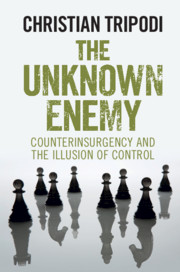Book contents
- The Unknown Enemy
- The Unknown Enemy
- Copyright page
- Dedication
- Contents
- Preface
- Acknowledgements
- 1 Culture Warriors
- 2 Themes and Issues
- 3 Knowledge, Influence and Control
- 4 ‘Peaceful Penetration’ on the North-West Frontier, 1919–39
- 5 ‘Hearts and Minds’ vs French Revolutionary War: Algeria 1954–62
- 6 Pacification in Vietnam 1964–72
- 7 Political Warfare in Iraq: Al Anbar and Basra, 2006–9
- 8 Political Warfare in Afghanistan: Helmand Province, 2006–12
- 9 Conclusion
- Bibliography
- Notes
- Index
9 - Conclusion
Published online by Cambridge University Press: 06 November 2020
- The Unknown Enemy
- The Unknown Enemy
- Copyright page
- Dedication
- Contents
- Preface
- Acknowledgements
- 1 Culture Warriors
- 2 Themes and Issues
- 3 Knowledge, Influence and Control
- 4 ‘Peaceful Penetration’ on the North-West Frontier, 1919–39
- 5 ‘Hearts and Minds’ vs French Revolutionary War: Algeria 1954–62
- 6 Pacification in Vietnam 1964–72
- 7 Political Warfare in Iraq: Al Anbar and Basra, 2006–9
- 8 Political Warfare in Afghanistan: Helmand Province, 2006–12
- 9 Conclusion
- Bibliography
- Notes
- Index
Summary
Over the course of the five case studies in this book, external actors sought to impose change upon a range of indigenous societies in order to satisfy chosen strategic objectives. Through an amalgamation of political measures and military action acting in combination to create a form of political warfare, a range of techniques were deployed to engineer favourable outcomes according to the preferences of that intervening power. Be it in the form of pacification, stabilisation or counterinsurgency, when coming up against populations that were perceived as holding the key to success these actors engaged in a variety of measures to both secure support and crush armed dissent: the offering of economic incentives and opportunity, the implementation of ambitious civic-action initiatives, the empowerment of key local leaders, the attempted reform of local and national governance structures accompanied a range of other actions designed to aid the betterment of local society. Alongside this lay the design and use of population control measures, the dissemination of propaganda, the use of psychological operations, and the attempted mobilisation of alliances and collaborators from among local groups be they class-based, tribal, ethnic or sectarian in nature. Underpinning all of these measures was the ready application of lethal violence when required.
- Type
- Chapter
- Information
- The Unknown EnemyCounterinsurgency and the Illusion of Control, pp. 196 - 208Publisher: Cambridge University PressPrint publication year: 2020



